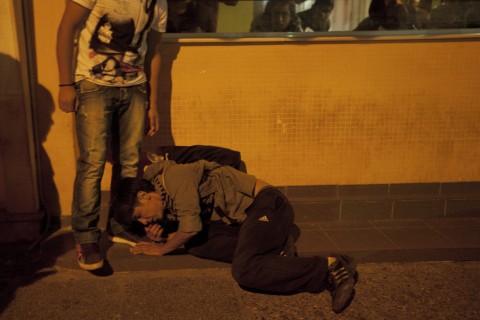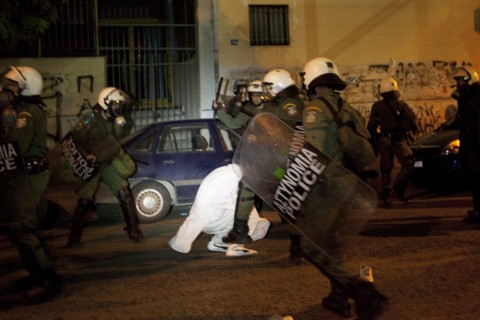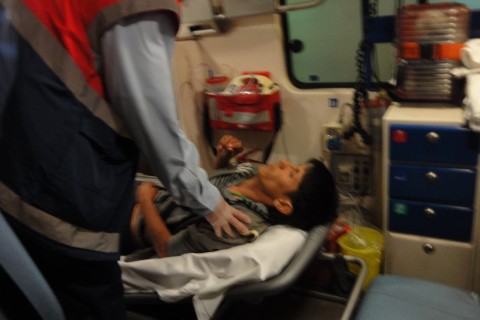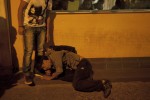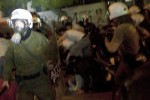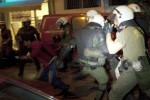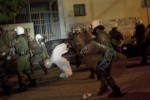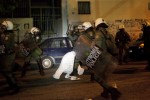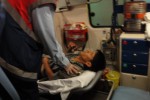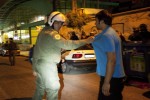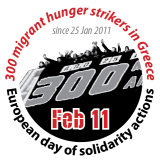One of the victims of the police beatings yesterday after the antifascist demonstration (of the 8th October) is H.
He is from Afghanistan and he is a victim of the Dublin II Regulation. Only two months ago he was deported back from Austria to Greece because of his fingerprints in Greece. Since then he is homeless. Now he is living with the hope that his lawyers` appeal against his deportation will have a success and allow him to return there. Within the two months he is in Greece it is the second time he was beaten by police forces in Athens and it is the second time he had to be transferred to the hospital. While waiting for the ambulance yesterday night a group of Afghans waiting with him was against his transfer into hospital: “Let’s bring him better to some house to have a rest and give him some Brufen (painkiller). There is nobody to accompany him to hospital and they will not do anything for him anyway. Who knows if the ambulance comes. When we called them, they said they cannot come here now. Believe me, they will not do anything. Apart from that, there are now many fascists and civil police around.” The ambulance came after the call of a Greek citizen. He was transferred into hospital. Twice doctors passed by and “had a look on him”. There were no x-rays taken. He was neither given pills nor an injection. He just got a bed for a night. But even that was in the cold. In the morning they told him to leave. “I told you this would happen”, a young Afghan says. “I have seen it many times. They don’t help us – you understand?”
H. came to Greece in 2008. It was only after the third try and after almost drowning in the Greek waters that he managed to arrive. He was 14 years old that time, but the police registered him as 16 year old unaccompanied minor. After a few months in Greece he went to Patras to try to leave to Europe. There he was caught by the coast guard inside the port while trying to climb on one of the trucks going to Italy. In that period the Greek authorities organised three illegal mass deportations of refugees caught in Patras. They were brought by busses to the Greek- turkish border in Evros and pushed-back to the Turkish side. When H. reached the Turkish territory he was arrested. He remained three months in prison. Since he had no 500 Dollars to pay his own deportation to Afghanistan, the Turkish authorities brought him together with others to the land-borders between Turkey and Iran, where they released them and told them to return to Iran walking all the way back over the mountains. He tried again to go to Europe. This time he was too afraid of Greece. He left directly from Turkey to Austria. He tried to apply for asylum telling his real age, but they found his fingerprints and due to them he was registered as 18 year old in March 2010. After a while he received a deportation decision and was directly arrested and transferred into the deportation prison of Vienna where he was held for 1 month and 5 days. He went on hunger strike for 8 days, but in the end he was just deported back to Greece even though he had Afghan documents proving that he was under-age. “Maybe I will try to go again to Patras to leave. I don’t know what to do. I hope I win my case against the Austrian government and will be able to return. I will not survive Greece!”
H. is not the only story of failure of the European asylum system for refugees. During the protests of the 8th October a young Afghan women takes the microphone to speak. She has been also deported from Austria back to Greece – with her two small children and her husband. She has a so called Pink Card (for asylum seekers) since her return, but it does not offer any protection to her and her family. Her emotions are out of control while she tells her story to the demonstrators demanding for the protection of all refugees instead of daily experiences of violence on the Greek streets. It is just 4 days that she was kicked out of the flat she had rented with her family, because she couldn’t pay the landlord anymore. She had a little bit of luck until recently, when she received some support donations after talking to German journalists on TV. It was this money her family used to pay a flat for some months. This is the exception not the rule in Greece. But now they ran out of money. Her husband desperately searches for jobs. Her new home is one of the many parks in Athens. It is raining since days. The temperature is bellow 15 degrees in the nights. Her two small children dream of their lives in Austria, when the world seemed to be fine. “It is your responsibility to help us!”, says S. holding her child in her arms and crying in anger.
